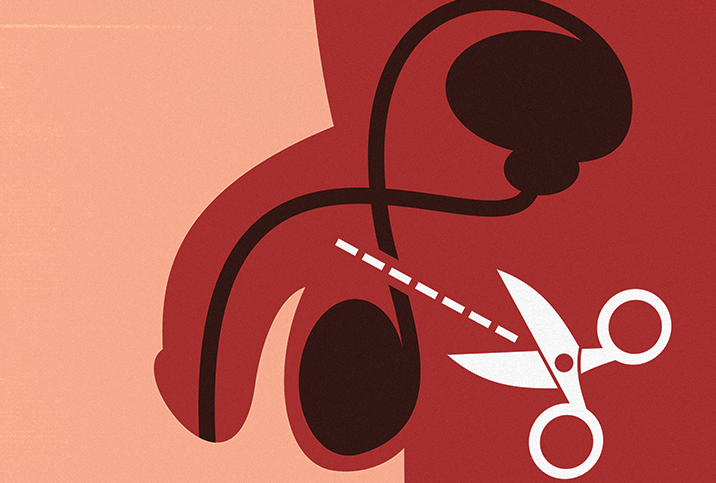Please Stop Believing These Vasectomy Inaccuracies

Historically, women have primarily carried the burden of responsibility for pregnancy prevention. Pills, implants and devices are often a regular part of women's birth control routines, sometimes from adolescence. Until a male contraceptive pill is introduced, a man's best option to avoid contributing to an unplanned pregnancy is a vasectomy.
Urologists reported a surge of interest in the procedure following the overturning of the Roe v. Wade abortion rights ruling in June 2022, and it's plausible many of those people believed several vasectomy inaccuracies before they attended consultations.
Don't let a lack of knowledge prevent you from prioritizing your sexual health and contraception options. A vasectomy is a safe and effective procedure with minimal side effects.
Inaccuracy #1
Vasectomies interfere with ejaculation and overall sexual health
Can you ejaculate after a vasectomy? Yes. A simple anatomy lesson quickly puts this myth to rest.
"Vasectomies do not impair ejaculation," said Joshua Gonzalez, M.D., a Los Angeles urologist and a sexual health advisor at Astroglide, a lubricant manufacturer. "They simply prevent the sperm from making it into your ejaculate fluid…[A] vasectomy does not impact libido and is not known to have any long-term effects on overall health. [Undergoing one] should not alter the appearance of your semen, only remove the microscopic sperm that are usually present."
Orgasms remain unaltered after the initial recovery, and there's no link between vasectomies and rates of sexually based cancers.
Inaccuracy #2
Recovery is painful and takes a long time
A surgery involving the genitals must require an extended, painful recovery, right? Wrong.
The vasectomy recovery period and a patient's return to baseline health don't take long and entail only mild discomfort and/or pain.
"To reduce any discomfort, I recommend scheduling Tylenol and/or ibuprofen after the procedure for the first few days and then taking them as needed," said Majdee Islam, M.D., a urologist and men's health specialist at Urology of St. Louis. "I also recommend wearing tight-fitting underwear for the next few days for support and to help with any discomfort, along with a cold compress with a cold towel. I also have men apply an antibiotic ointment to the incision daily for a week to reduce the risk of infection."
A vasectomy is a long-weekend surgery, according to Gonzalez.
"I typically recommend my patients take it easy for a couple of days," he said. "We typically do vasectomies on Fridays to allow patients the weekend to recover. After that, most can return to work and daily activities. Some men may experience discomfort for up to one week, but not usually enough to prevent them from their daily routine."
Inaccuracy #3
The effects of a vasectomy are immediate
Men need to use some form of contraception for a few months following the procedure.
"Yes, vasectomies can be unsuccessful at preventing pregnancy if there are still swimmers in your ejaculate," Gonzalez said. "Typically, after vasectomy, a semen analysis is checked within the first three months to confirm sterility. It can sometimes take a while to 'clean out the pipes' following vasectomy. Until that happens, I generally recommend patients continue to use contraception."
Islam was specific as to how many ejaculations are typically needed to flush out said pipes.
"After the vasectomy, there are still viable sperm that are swimming around downstream from where the procedure was performed on the vas deferens [the tubes that carry sperm]," he said. "Therefore, it is recommended that guys ejaculate at least 15 to 20 times over the course of the next two months after the procedure. During these two months, it is extremely important to continue to use some kind of birth control, as men can still father a pregnancy."
Inaccuracy #4
Vasectomies are irreversible
A vasectomy is a big decision, but its permanence isn't written in stone.
"Vasectomies can be reversed, but their success rate can depend on how long it's been since the initial vasectomy," Gonzalez said.
The reversal's success, or lack thereof, has more to do with the man's age than with the procedure itself.
"As men age, the sperm quality, meaning sperm numbers, movement and shape, does indeed start to decrease, usually after the age of 40 to 50," he said. "However, it really never gets to the point where it decreases to zero in number."
A man's sperm quality likely won't decrease to the point where he won't be able to initiate pregnancy, he continued.
Still, pregnancy success rates following a vasectomy reversal inhabit a large range, from 30 percent to 90 percent. A little planning before the initial vasectomy can alleviate any worries about the chances of conceiving after a reversal. Making a deposit at a sperm bank for freezing before the procedure is a good idea as an insurance policy against a change of heart or unforeseen life circumstances.
As long as you're sexually active, you'll never be too old for a vasectomy.


















